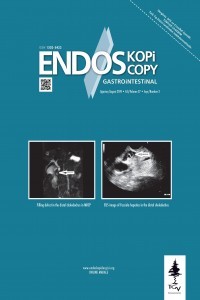İnflamatuvar barsak hastalıklarında endoskopik izlem: Kime? Ne zaman? Nasıl?
İnflamatuvar barsak hastalığı, endoskopik, de¤erlendirme
Endoscopic monitoring in inflammatory bowel diseases: in whom, when, and how?
Inflammatory bowel disease, endoscopic evaluation,
___
- Hommes DW, van Deventer SJ. Endoscopy in inflammatory bowel di- seases. Gastroenterology 2004; 126: 1561-73.
- Rutgeers P, Vermeire S, Van Assche G. Mucosal healing in inflammatory bo- wel disease: impossible ideal or therapeutic target ? Gut 2007; 56: 453-5.
- De’Haens G, Sandborn WJ, Feagan B, et al. A review of activity indices and efficiacy endpoints for clinical trials of medical therapy in adults with ulcerative colitis. Gastroenterology 2007; 132: 673-86.
- Sandborn WJ, Feagan BG, Hanauer SB. A review of activity indices and efficiacy endpoints for clinical trials of medical therapy in adults with Crohn’s disease. Gastroenterology 2002; 122; 512-30.
- Rutgeerts P, Colombel JF, Reinisch F, et al. Infliximab induces and ma- intains mucosal healing in patients mucosal healing in patients with ac- tive ulcerative colitis: The ACT trial experience. Gut 2005; 54(Suppl VI- I): A58.
- Farrell RJ, Peppercorn MA. Endoscopy in inflammatory bowel disease. In: Kirsner’s Inflammatory Bowel Disease. Sartor BR, Sandborn WJ (Eds). 6th Ed. Saunders, Toronto. 2004: pp: 380-98.
- Stange FE, Travis SPL, Vermeire S, et al. European evidence-based con- sensus on the diagnosis and management of ulcerative colitis: Definiti- ons and diagnosis. J Crohn’s&Colitis 2008; 2: 1-23
- Arnott ID, Watts D, Ghosh S. Review article: is clinical remission the op- timum therapeutic goal in the treatment of Crohn’s disease ? Aliment Pharmacol Ther 2002; 16: 857-67.
- Rutgeerts PJ. Review article: the limitations of corticosteroid therapy in Crohn’s disease. Aliment Pharmacol Ther 2001; 15: 1515-25.
- Landi B, Anh TN, Cortot A, et al. Endoscopic monitoring of Crohn’s di- sease treatment: a prospective, randomized clinical trial. The Groupe d’Etudes Therapeutiques des Affections Inflammatoires Digestives. Gas- troenterology 1992; 102: 1647-53.
- Deparno M, D’haens G, Van Assche G, et al. Development and validati- on of a new, simplified endoscopy activity score for Crohn’s disease: the SES-CD. Gastrointest Endosc 2004; 60: 505-12.
- D’Haens G, Goebes K, Rutgeerts P. Endoscopic and histologic healing of Crohn’s (ileo-) colitis with azathioprine. Gastrointest Endosc 1999; 50: 667-71.
- Lichtenstein G, Abreu MT, Cohen R, et al. American Gastroenterological Association Institute technical review on corticosteroids, immunomodu- lators and infliximab in inflammatory bowel disease. Gastroenterology 2006; 130: 940-87.
- Clark M, Colombel FJ, Feagan BC, et al. American Gastroenterological Association Consensus Development Conference on the use of biologic in the treatment of inflammatory bowel disease, June 21-23, 2006. Gas- troenterology 2007; 133: 312-39.
- D’Haens G, Van Deventer S, Van Hogezand R, et al. Endoscopic and his- tologic healing with infliximab anti-tumor necrosis factor antibodies in Crohn’s disease: a European multicenter trial. Gastroenterology 1999; 116: 1029-34.
- Hanauer S, Feagan BG, Lichtenstein GR, et al. Maintenance infliximab for Crohn’s disease: the ACCENT I randomised trial. The Lancet 2002; 359: 1541-9.
- Cima RR, Pemberton JH. Surgical management of ulcerative colitis. In: Kirsner’s Inflammatory Bowel Disease. Sartor BR, Sandborn WJ (Eds). 6th Ed. Saunders, Toronto. 2004: pp: 603-13.
- Travis SPL, Stange FE, Lemann M, et al. European evidence-based con- sensus on the management of ulcerative colitis: Current management. J Crohn’s&Colitis 2008; 2: 24-62.
- Biancone L, Michetti P, Travis SPL. European evidence-based consensus on the management of ulcerative colitis: Special situations. J Crohn’s&Colitis 2008; 2: 63-92.
- Ng Siew C, Kamm MK. Management of postoperative Crohn’s disease. Am J Gastroenterol 2008; 103: 1029-35.
- Caprilli R, Gassull MA, Escher JC, et al. European evidence based con- sensus on the diagnosis and management of Crohn’s disease: Special si- tuations. Gut 2006; 55(Suppl I): i35-i58.
- Hanauer SB, Korelitz BI, Rutgeerts P, et al. Postoperative maintenance of Crohn’s disease remission with 6-mercaptopurine, mesalamine or place- bo: a 2-year trial. Gastroentrology 2004; 127: 723-9.
- Rutggerts P, Goebes K, Vantrappen G, et al. Predictability of the posto- perative course of Crohn’s disease. Gastroenterology 1990; 99: 956-63.
- Langholz E, Munkholm P, Davitsen M, et al. Changes in extent of ulce- rative colitis: A study on the course and prognostic factors. Scand J Gas- troenterol 1996; 31: 260-6.
- ISSN: 1302-5422
- Başlangıç: 2010
- Yayıncı: Türk Gastroenteroloji Vakfı
İnflamatuvar barsak hastalıklarında endoskopik izlem: Kime? Ne zaman? Nasıl?
2 olgu nedeniyle kronik pankreatit akut ataklarında endoskopik tedavi
Fehmi ATEŞ, Serkan YARAŞ, Bünyamin SARITAŞ, Engin ALTINTAŞ, Orhan SEZGİN
Gastrointestinal stromal tümörü taklit eden sıradışı bir gastrik ektopik pankreas olgusu
Cem CENGİZ, Dilek OĞUZ, Yasemin Yuyucu KARABULUT, Berna SAVAŞ, İskender ALAÇAYIR
Asemptomatik duodenal duplikasyon kisti
Reskan ALTUN, Serkan ÖCAL, A. Emre YILDIRIM, Enver AKBAŞ, Murat KORKMAZ, Haldun SELÇUK, Uğur YILMAZ
Emrah ALPER, Behlül BAYDAR, Cem ÇEKİÇ, Fatih ASLAN, Serdar AKÇA, Belkıs ÜNSAL
“Friedreich ataksili” olguda gastroözofageal reflü bulguları ve nedenleri
